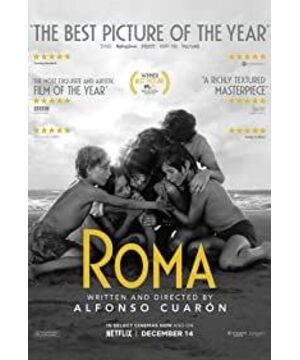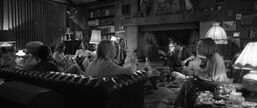WeChat public account: moviesss first published on MOViE
After coming out of the cinema, I am more convinced that the dispute about "Rome" is actually just one thing: it is good, is it the best of 2018 or the top ten of the year? Or, it's just the kind of "good" that follows the trend, mediocrity, and harmony. Otherwise, there will be the addition of the Golden Lion and Oscar, even if involved in the Netflix storm, it has nothing to do with the polarities of evaluation.
A huge wave of 15 meters high (maybe more than one) will appear in "Interstellar" or "Wandering Earth". If it is described as an overwhelming and overwhelming experience of watching movies, it is about the same as Alfonso Cuarón's "Son of Humanity" and "Gravity", thrilling and thrilling, with waves higher than waves.
Many people believe that they watched "Rome" with a fifteen-meter-high wave, but the waves they saw were only two meters high.
However, if you are in the cinema and feel the turbulent waves two meters high at the end, the sound is shocking like thunder, wave after wave, slapped on the maid Clio and the two children, almost overwhelming them. I think the waves are enough to swallow children-and there are definitely more than two, and even overshadowed the gunfire on the street.
Before the waves, "Rome" created a lot of undifferentiated waves of stories, slapped on the members of the Mexican Middle Class. For children, it is growth games and emotional education. From hail to forest fires, from gun games to family separation. When the mother announced that his father was leaving the house, the emotional reactions of the four children turned out to be completely different. If you experienced similar family changes during your childhood and adolescence, I think no one wants to be beaten by such waves.
Someone asked which character is the incarnation of director Caron. The child who is closest to Creo has a high chance of being. It is more likely that Caron has been incarnate in all the children, running after the camera.
"Rome" is a group portrait film. As the protagonist, Creo is a maid who acts as a facilitator in the story. Whenever the story suddenly tilts towards her, she will encounter a greater blow, like love from disillusionment, a big family in peril, and the turmoil on the streets, Mexican society in the early 1970s. Creo did not appear as a sacrificial role without complaint. She represents the existence of pits and muddy rural slums. She speaks a dialect different from Spanish, has her own social circle, and is blocked in the coquettish cup. Outside of my life, I am more worried about losing my job than I am afraid of getting pregnant, and there is no insurance.
The intimidation that Clio encountered was more like a malicious bottom-level mutual harm. The man said that martial arts saved him, but what he did showed that the violence in his body did not end, but that he was cyclically doing evil in society in a more terrifying way. Clio, who doesn't know how to swim and is desperate to save his children, said in palpitations that he hadn't thought about the birth of his own child, and this was the reason.
In contrast to Creo, is the big family with many rooms and spacious spaces. When the male owner (father role) uses obsessive-compulsive disorder, he drives into the warehouse. What I did was because of his doctor’s occupational disease, forcing him to do so, and spitting at the stinky shit on the floor. However, when the hostess (mother role) repeatedly ravaged the car that did not match her identities by forcibly smashing the lottery, "Rome" quickly completed the coincidence of the identities of the mother and the woman. Clio and the hostess, they are two people, and they are just one person. Just like Roma spelled backwards, it is Amor (Spanish). This movie is all about "love".
This kind of love is like scouring the floor over and over again, overflowing with flowing water, projecting out the sky of Mexico City, and a plane passing by. It is a larger world, completely out of the siege of this big family, spreading to the neighborhood where small vendors pass by, passing through the studio block that can only be completed in the era of the big Hollywood studios, in front of the cinema with all kinds of noises, A city square surrounded by crowds.
To perceive and experience all of these, and to wrap them in good condition, is the heart of a child. In my opinion, the sound design of "Rome" highlights the sounds that are most easily captured by children. There is also the fire of the mountains and the waves of the sea. No matter what the name is, going to the countryside to the seaside is a happy time for children.
In hindsight, the current on the floor was only to herald the ending waves? The whole film is filled with all kinds of water currents and liquids, standing water, sewage, rain, hail, blood, tears, amniotic fluid and overturned tequila, as well as puddles, rivers, and oceans. You know, water can change its form to adapt to various venues.
Creo was blamed by his master to clean up a pile of shit on the ground (seems deliberately more), and then washed it over and over again. She is self-dwarfed and hated by others as a maid, which will make some viewers take it for granted that she is playing the image of the family's loyal dog. In the movie, Clio calls the big dog and interacts with it the most.
In the countryside, the dogs guarding the manor were all made into specimens by the owner and hung on the wall to commemorate them. When the maid and the big dog are juxtaposed, it is not difficult to find that "Rome" also tells the social reality beyond love.
When the scene of "Rome", I slowly walked out of the family, especially when I bought a crib and went to the hospital for a few scenes. The climax of this part of the drama appears in the form of one tight and one loose. The former is sudden, brutal invasion, bloody, cruel and ruthless. In the scene behind the operating table, the camera was motionless, calm and flustered. The doctor in the depth of field, without emotion, repeats the examination steps. Creo, who was close to the camera, was hit by a mixture of nervousness, dazedness, anxiety and fear in turn, and his performance was demanding. One complete long shot after another-I don't care about any dazzling skills. This is a real movie.
Especially the relationship between Clio and the martial arts man is neat and tidy. Recall that there were only five or six scenes before and after. In the first scene, after they left, the man grabbed the unfinished drink and took a big mouthful. In the second scene, outside the cinema, the man excuses that the weather is good and he does not want to watch the movie. In the third scene, in the hotel room, the man is preoccupied with martial arts and talks about the past. Creo is affectionate. In the fourth scene, he hurried off before the end of the movie. In the fifth game, he threatened Clio fiercely and yelled. In the sixth game, the God of Destiny asked him to aim his gun at his child. Creo's heart was ashamed. Some people say that there are no characters in "Rome"? Isn't this martial arts man just a devil who is surging forward?
There are dozens of actors in the fire fighting, big and small. Just move, deal with the big fire and small fire on the soles of your feet, and then the big tree crashed down. Although it is not necessary to burn it only once, no one wants to burn it a second time.
"Rome" is more like a personal memoir, rather than a huge epic film. Those street gunshots, without the cause and effect, only exist as a background board. The society is still in motion. Creo who has lost a child, and a family that has lost their axis, their lives are still going on. It's like a big wave in the past, it's not a two-meter wave that becomes an objective reality, but leaves soap bubbles that preserve innocence and are scattered with the taste of daily life. What one generation teaches the next generation is not just blowing a string of soap bubbles. Will forget, will pass.
The waves that came from the past, the rain that came from the past, you and I all remembered our true form.
View more about Roma reviews











